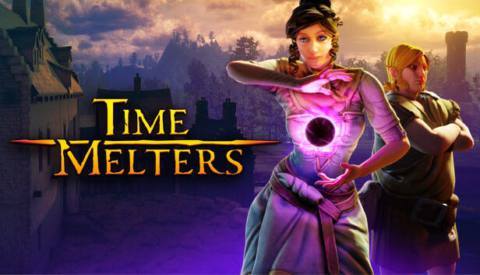
In Timemelters, time is a shoelace. It bends and twists. What you’ve done with one part of the lace can effect the other parts in unusual ways. You get loops, but also knots and snarls and tangles. Sometimes, you get bows.
Listen. Just yesterday – yesterday in the real world – I was running up a snowy hill – this part was not in the real world – and I saw a bunch of enemies ahead of me, closing in on a friend of mine who had no defences. If my friend died, it would be bad: game over. I was out of range and out of mana, but I was also close enough to attract my enemies’ attention, and they started to run at me. Stumped, my hands left the keyboard: I had pretty much given up. And then I watched, stunned, as someone entirely new raced into frame and briskly zapped all the enemies dead. I blinked. My friend who had no defences survived. I, who was out of mana, survived. And the person who had come to our aid was…me? An earlier me. Me from about five minutes ago. Welcome to Timemelters.
Fittingly for such a temporally complex game, let’s start by going back a bit. Not back to the 16th century, where Timemelters is set, in a Scotland riddled with witch trials and supernatural paranoia, but back to Sang-Froid: Tales of Werewolves, a gloriously weird strategy-action hybrid from 2013. Sang-Froid is a proper masterpiece if you ask me, and it’s a strange masterpiece, which makes it even better. You play as a lumberjack whose sister, I think, is being targeted by the devil. Every night the devil sends wolves to attack your farm and so you place traps, lay defences, and also run around the joint in real-time smacking these beasts about with an axe. During the day, you work chopping lumber to earn money to build up your traps and defences for the night ahead.






